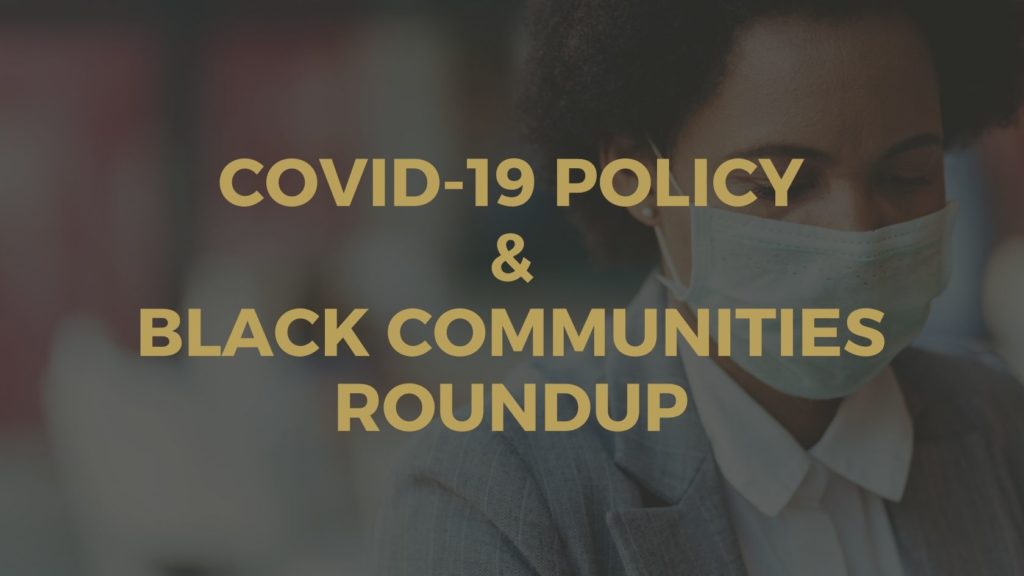
May 4 COVID-19 Policy & Black Communities Roundup
This roundup reviews recent COVID-19 policy developments that affect Black communities. Click here for our COVID-19 policy page, which is constantly updated.
Last week, Republicans and Democrats continued to stake out their positions on the next major stimulus, and some Members made continued efforts to ensure equitable implementation of past stimulus packages.
This week, the U.S. Senate has returned to DC while U.S. House Members continue to work on the next stimulus package remotely due to the virus. COVID-19 is hitting the Black Rural South particularly hard, and yet most Southern states are opening their economies.
Details below.
Stay safe and informed,
– Spencer Overton, President
The Next Major Stimulus: CARES Act 2
For the next major coronavirus relief bill (“phase four” or “CARES 2”), congressional Democrats are examining more aid for state and local governments (which have suffered income and sales tax revenue declines), expansion of food nutrition assistance, funding for mail-in voting, a third round of stimulus checks directly to individuals, boosting unemployment benefits, and expanding broadband in rural and other underserved areas.
Congressional Republicans are mixed on stimulus checks to individuals and expanded unemployment benefits, and are pressing for provisions that protect companies from lawsuits as they reopen. Democrats are concerned that such limitations on corporate employer liability would fail to protect workers. For more, see The Hill (May 3 and Apr. 30), Axios and remarks by House Speaker Pelosi and Senate Majority Leader McConnell.
Congressional Progressive Caucus Members are pressing to include “free coronavirus treatment, paid family and sick leave for all workers, free protective equipment, halting evictions and foreclosures, and relieving student debt.” Another possibility is a paycheck guarantee program, which gives grants to businesses “to pay 100 percent of worker salaries of up to $100,000 for three months.” Politico.
Broadband in the CARES Act 2
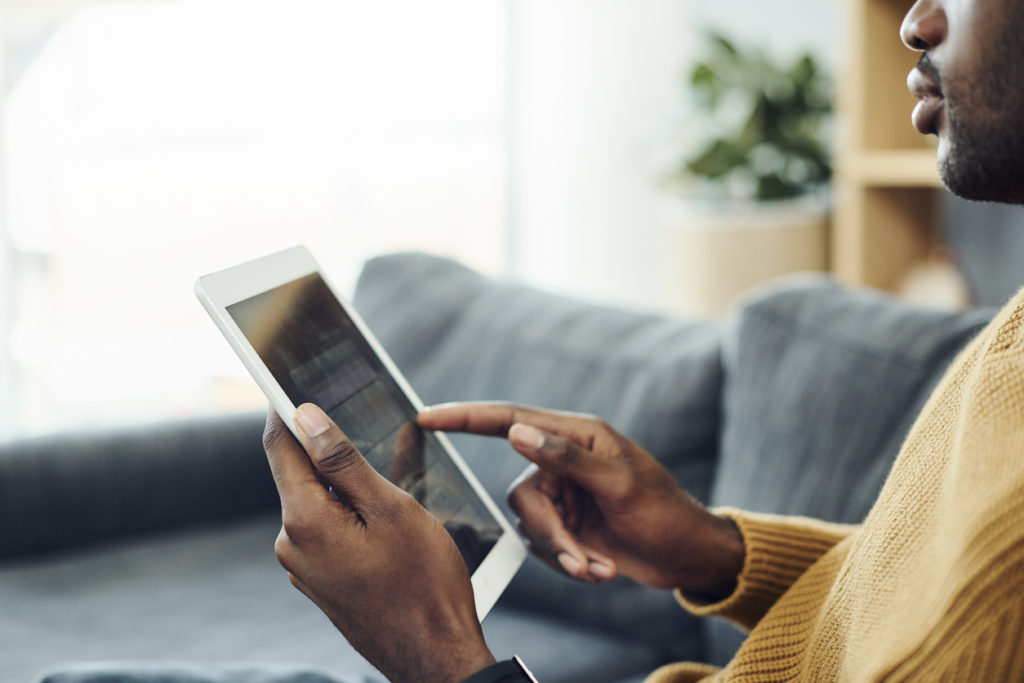
The Joint Center signed on to a letter to House and Senate leadership urging Congress to “support access to affordable broadband internet in forthcoming COVID-19 stimulus packages.” The letter, which was organized by Public Knowledge, also includes signatures from HBCU Innovation Center, NAACP, and others.
Several Members of Congress responded. CBC Members James E. Clyburn and Marc Veasey and others announced the House Democratic Plan to Connect All Americans to Affordable Broadband Internet which calls for $80 billion over five years to deploy broadband infrastructure to unserved and underserved rural, suburban, and urban areas. Senator Ed Markey introduced legislation to establish a $4 billion emergency connectivity fund so that qualifying schools and libraries can purchase Wi-Fi hotspots, modems, and routers for students during the COVID-19 pandemic.
The NAACP LDF, NAACP, National Urban League, and others issued a joint statement with practices and recommendations for equitable educational opportunities during the COVID-19 school closures related to distance learning and digital access and other critical issues.
Former CBC Chair Congresswoman Marcia Fudge, Senator Amy Klobuchar, and other Members wrote Federal Communications Commission Chair Ajit Pai calling for him to coordinate with the USDA and HHS to inform the millions of people who have recently suffered displacement or reductions of income of their eligibility for the FCC’s Lifeline program, a key federal program to help low-income families obtain broadband.
FCC Chair Pai announced that the FCC will publicize the use of the $16 billion in funding from the recently enacted CARES Act to provide broadband connectivity and devices to support remote learning.
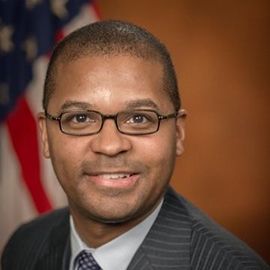
Today FCC Commissioner Geoffrey Starks hosted “HBCU Presidents’ Roundtable on The State of Connectivity in the Age of the COVID-19 Pandemic.”
For more on the concept of a “connectivity stimulus,” watch the Joint Center’s online briefing with FCC Commissioner Starks and many other leaders.
Fair Implementation of Past Stimulus Packages

Many Black-owned small businesses continue to have trouble accessing the CARES Act’s Paycheck Protection Program (PPP), which extends loans that can turn into grants that don’t need to be repaid if they are used for expenses like payroll, rent, and utilities. Businesses apply through banks, some of which have allegedly prioritized the applications of their larger corporate customers over the applications of smaller businesses. This is a problem because businesses depleted the first congressional allocation of funding for PPP loans April 15, and experts predict that the second allocation signed into law April 24 could be depleted even more quickly. A Goldman Sachs survey of 10,000 small businesses from Apr. 20-21 showed that 40% of Black business owners had been approved for a PPP loan (compared to 52% overall).
While the interim stimulus package signed into law on April 24 provided $30 billion for loans made by Community Development Financial Institutions, Minority Depository Institutions, and other smaller lenders that have a stronger track record serving Black businesses, many smaller lenders were disadvantaged in their capacity to issue PPP loans due to Treasury Department regulations limiting participation to larger lenders and a lack of access to the Federal Reserve’s PPP Liquidity Facility.
Last week, the Treasury Department issued revised guidance lowering the required lending threshold from $50 million to $10 million for nondepository lenders and the Federal Reserve opened their liquidity facility to all PPP lenders approved by the Small Business Administration. While these changes are welcome, they are likely too late to spur meaningful participation in the PPP program by additional smaller lenders before the second round of PPP funding is depleted.
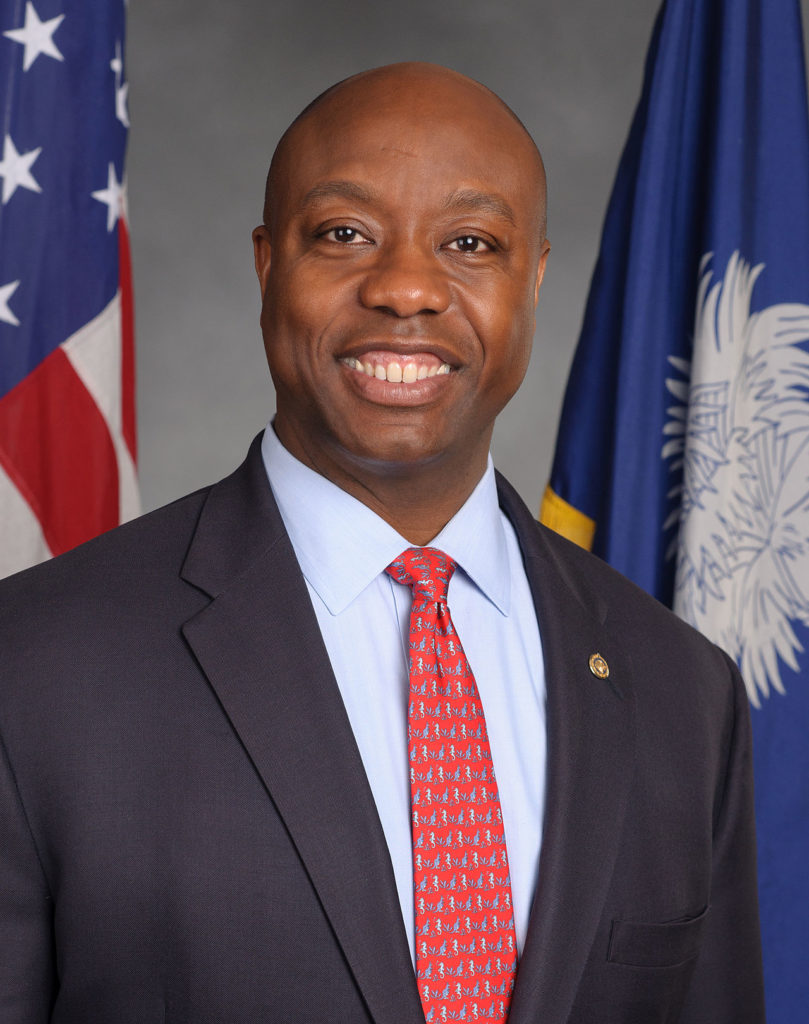
Last week, Senator Tim Scott called for the Treasury Department and Small Business Administration to provide greater guidance on loan forgiveness under the PPP program, and today asked Treasury and the IRS to modify rules for investors in Opportunity Zones in the wake of COVID-19.
House Financial Services Chair Congresswoman Maxine Waters requested that payday lenders be excluded from PPP loans, stating that these predatory businesses cause irreparable financial harm to consumers.

House Speaker Pelosi appointed House Financial Services Committee Chair Maxine Waters and House Small Business Committee Chair Nydia Velázquez to serve as Members of the House Select Committee on the Coronavirus Crisis, which oversees the $2 trillion CARES Act and is chaired by Majority Whip James Clyburn. The leadership of Congresspersons Clyburn, Waters, and Velázquez is particularly important because Republican and Democratic House and Senate leaders did not appoint any African Americans or Latinos to another important COVID-19 oversight body—the Congressional Oversight Commission.
Check out Friday’s Washington Bureau Insider from the National Urban League, which is rich in COVID-19 policy.
COVID-19’s Impact on the Black Rural South
Last week, the Center for American Progress released a study showing that COVID-19 cases are quickly expanding into the Black Rural South. As of the beginning of April, residents of the Black Rural South were over twice as likely to die from COVID-19 than residents of three other rural regions in the study (i.e., Greying America, Rural Middle America, and Evangelical Hubs). Of African Americans who live in rural areas, over 17% lack health insurance, 66% cannot cover a $400 expense in an emergency, and 81% have medical debt due to an unexpected health emergency—all of which are much higher than African Americans in metro areas and whites in both metro and rural areas.
The Washington Post reports that Georgia (the first state to re-open) has seen a higher case and death rate in rural areas than urban centers. All five counties with the highest number of cases per capita are in southwest Georgia, and all are predominantly Black. Surveying 8 hospitals in Georgia, the Centers for Disease Control and Prevention found that more than 80% of COVID-19 patients at those hospitals were African Americans. Third Way found that in rural areas, there were higher rates of infection among counties with more people of color, many of whom work in industries where social distancing is difficult, like food service, food processing, and health care.
For more background on economic conditions in the Black Rural South, see the Joint Center’s report An Introduction to the Future of Work in the Black Rural South.
Half of the States are Reopening—Including Most of the South
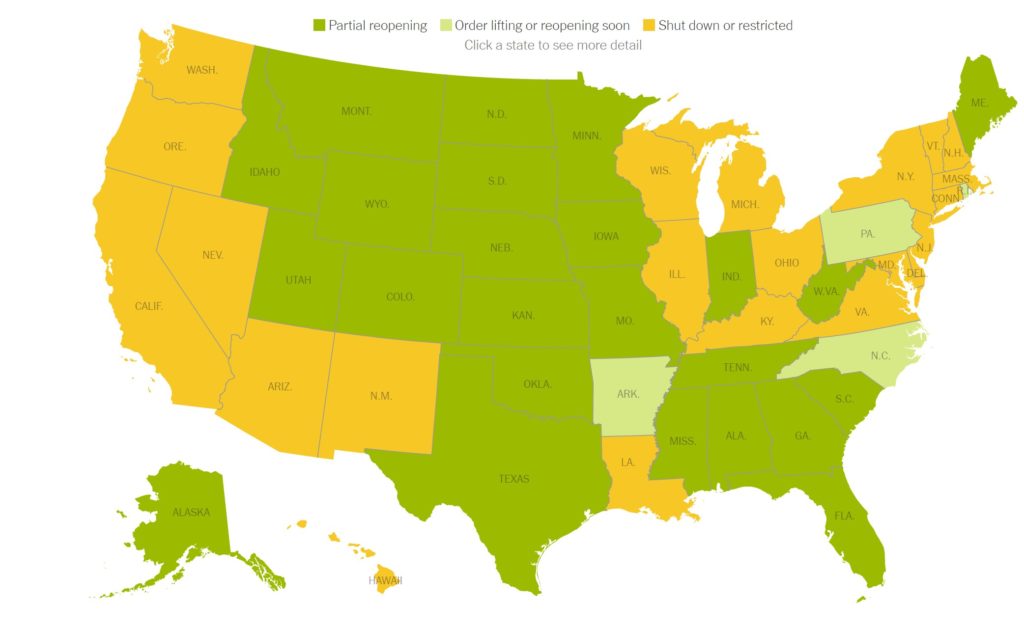
About half of the states have begun to reopen their economies—including Alabama, Florida, Georgia, Mississippi, South Carolina, and Tennessee—even though the number of new cases are growing in many areas. The Southern Education Foundation points out that nationally, people of color constitute a disproportionate share of frontline workers with Black and Latino employees representing nearly 30% of postal workers, 37% of workers in leisure and hospitality, 41% of food service workers, and 30% of workers in retail.
CNN reports that a coalition of civil rights organizations—including the National Action Network, the NAACP, the National Urban League, and the Lawyers’ Committee—is urging African American residents who live in states that are moving swiftly to reopen their economies to stay home in defiance of governors until there’s evidence the coronavirus outbreak has eased.
The Hill quoted a poll that stated that 66 percent of Americans surveyed did not want to return to their workplace during the coronavirus pandemic. According to the article, “several states such as Georgia, Texas and Iowa have stated that employees who refuse to work will become ineligible for unemployment benefits provided by the CARES Act.”
National Urban League’s Marc Morial writes that “The Rush to Reopen Economy Risks Lives and Could Worsen the Economic Crisis.”
Economic Studies & COVID-19
The weekly unemployment numbers released last week showed that 3.8 million workers filed for unemployment, bringing the six-week total to 30 million. The data released last week was about 600,000 fewer unemployment claims than the previous week—but still much higher than the pre-COVID single-week high of 695,000 in 1982.
The Economic Policy Institute released a study that shows that possibly 50% more people were eligible for unemployment than filings show because of a clogged filing process.
The Washington Post explored industries hit worst and pointed out that more “white-collar” and public sector workers are starting to experience increased unemployment.
Worker cooperatives in Mississippi organized a workers’ strike May 1 around the country. Employees of Amazon, Whole Foods, Walmart, FedEx, Target, and Instacart protested for better compensation and personal protective equipment (PPE) while working during the COVID-19 pandemic. (See The Washington Post, Salon, NBC News).
Political Studies & COVID-19
Last week, Joint Center President Spencer Overton spoke at a Rainbow PUSH Coalition town hall on the best ways to move forward with an action plan to combat the coronavirus pandemic for Black communities.
Demos released “How to Build a Racially Inclusive Democracy During COVID-19 and Beyond,” which argues that Congress should allocate $4 billion and mandate that States accepting the money implement online voter registration and universal same-day registration, expand racially-equitable opportunities to vote-by-mail, and ensure safe in-person voting before and on Election Day. Stacey Abrams and other voting rights experts made similar recommendations during our Joint Center webinar on the topic.
Organizing and Town Halls

Color of Change created a donation platform to bail out Black mothers who are incarcerated and put at risk to coronavirus for not paying bail. Every donation collected will be used to bail out as many Black moms and caregivers as possible.
The Ella Baker Center for Human Rights pressed for the release of incarcerated people inside of Santa Rita Jail in Dublin, California, where 34 people had tested positive for COVID-19 as of April 27.
The Leadership Conference wrote a comprehensive letter urging Congress to craft laws that produce a more equitable, healthy, and just society post COVID-19.
Upcoming events include “Care not Cages: Fighting for our Incarcerated Youth During the COVID-19 Crisis” (Black Futures Lab, May 4); “Faith in Action During COVID-19” (National Action Network, May 4); “A Telephone Town Hall with First Responders” (CBC, May 4); “Support for Next Generation Business Leadership During COVID-19” (NextGen Chamber of Commerce, May 4); and “COVID-19 & Black Communities: Crisis, Opportunity and Prescriptions for Change” (Center for Urban and Racial Equity, May 7).
Last week events were held by Associated Black Charities, CBCF, Black Communities: A Conference for Collaboration, Minority Health Institute, NAACP, Third Way, and New America.

